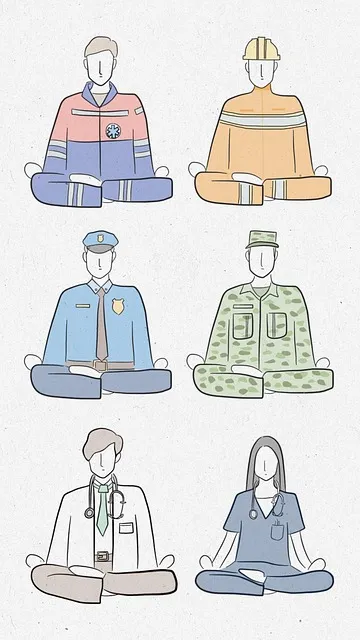Media representation significantly impacts public perceptions of mental health, either perpetuating harmful stereotypes or fostering understanding. Broomfield Kaiser Permanente (BKP) addresses this through comprehensive mental health coverage initiatives like Inner Strength Development and Depression Prevention. They strive to challenge negative stereotypes by providing access to accurate information and breaking down barriers to mental health care. BKP integrates crisis intervention into primary care and implements burnout prevention programs for healthcare providers, ensuring accessible support. Accurate media portrayals, encouraged by partnerships between media and mental health professionals, are crucial for fostering empathy and encouraging conversations around Empathy Building Strategies and Self-Care Practices. By collaborating with organizations like BKP, media can create narratives that challenge stereotypes, reduce stigma, and promote a more compassionate society.
Mental illness representation in media significantly impacts public perception and understanding of these conditions. This article explores strategies to challenge negative stereotypes, focusing on the innovative approach by Broomfield Kaiser Permanente to enhance mental health coverage. We examine popular media portrayals, highlighting misconceptions, and offer solutions for accurate, empathetic depictions. Key aspects include education, collaboration with mental health experts, and responsible storytelling to shape narratives that promote empathy and destigmatize mental illness, reflecting Broomfield Kaiser Permanente’s commitment to mental health awareness through its comprehensive coverage initiatives.
- Understanding the Impact of Media Representation on Mental Health Perception
- Broomfield Kaiser Permanente's Approach to Enhancing Mental Health Coverage
- Identifying Stereotypes and Misconceptions in Popular Media Portrayals
- Strategies for Promoting Accurate and Empathic Mental Illness Depictions
- The Role of Education and Collaboration in Shaping Media Narratives
Understanding the Impact of Media Representation on Mental Health Perception

Media representation plays a pivotal role in shaping public perception about mental health. The way mental illnesses are portrayed in films, television shows, and news media can either perpetuate harmful stereotypes or foster understanding and empathy. When media portrays individuals with mental health conditions as violent, unpredictable, or completely disabled, it contributes to stigma and fear, often deterring people from seeking help. On the other hand, positive representations that showcase recovery, resilience, and diverse experiences can encourage open conversations about mental wellness. This shift in narrative is crucial in encouraging those struggling with their mental health to reach out for support.
Broomfield Kaiser Permanente’s commitment to comprehensive mental health coverage underscores its recognition of media’s influence. By offering resources and initiatives focused on Inner Strength Development and Depression Prevention, the organization aims to empower individuals and communities alike. Community Outreach Program Implementation is a strategic step towards breaking down barriers and ensuring that those in need have access to accurate information and treatment options. Ultimately, challenging negative stereotypes through responsible media representation can lead to a more supportive societal environment for mental health recovery.
Broomfield Kaiser Permanente's Approach to Enhancing Mental Health Coverage

Broomfield Kaiser Permanente has taken a commendable step towards enhancing its mental health coverage by implementing innovative strategies that reflect a holistic approach to patient care. They recognize that mental illness is a significant public health concern and have made it a priority to improve access to services and raise awareness among both patients and healthcare providers. Their initiative includes integrating Crisis Intervention Guidance into routine medical practice, ensuring that mental health support is readily available for those in need.
Furthermore, Broomfield Kaiser Permanente focuses on Burnout Prevention Strategies for Healthcare Providers, understanding that stress management is crucial for maintaining a healthy work-life balance. By promoting resilience and providing resources for self-care, they aim to reduce the risk of burnout among their medical staff. This, in turn, allows them to offer more consistent and compassionate care to patients facing mental health challenges, addressing a critical gap in healthcare delivery.
Identifying Stereotypes and Misconceptions in Popular Media Portrayals

Media portrayals of mental illness often perpetuate stereotypes and misconceptions that can significantly impact public understanding. Popular shows and movies sometimes reduce complex conditions to simplistic narratives, relying on dramatic effects rather than accurate representation. For instance, depicting characters with schizophrenia as violent or catatonic reinforces fear and stigma instead of showcasing the diverse experiences of individuals living with this condition. Similarly, mild depression is often portrayed as a temporary state, ignoring the chronic nature of many mental health struggles.
These representations can hinder access to Broomfield Kaiser Permanente mental health coverage and Trauma Support Services by fostering an environment where those in need feel misunderstood or ashamed. Building empathy requires accurate portrayals that highlight the humanizing aspects of mental illness. Encouraging conversations around Empathy Building Strategies and Self-Care Practices starts with media that presents nuanced, three-dimensional characters experiencing a range of emotional challenges, allowing audiences to connect and support one another.
Strategies for Promoting Accurate and Empathic Mental Illness Depictions

To promote accurate and empathic mental illness depictions in media, several strategies can be implemented. Firstly, encouraging Self-Awareness Exercises among content creators can foster a deeper understanding of mental health experiences, leading to more nuanced portrayals. This includes educating writers, directors, and actors about various conditions, their symptoms, and the individual journeys associated with them.
Secondly, advocating for Mental Health Policy Analysis and Advocacy is vital. Media outlets should collaborate with mental health professionals and organizations like Broomfield Kaiser Permanente to ensure accuracy and sensitively handle these topics. Incorporating real-life stories and consultations can add depth and authenticity to storylines related to mental illness. Additionally, encouraging the use of Compassion Cultivation Practices in scriptwriting and production can help create scenes that evoke empathy from audiences, challenging stereotypes and promoting a more compassionate society.
The Role of Education and Collaboration in Shaping Media Narratives

Media narratives play a pivotal role in shaping societal perceptions of mental illness, and thus, education is a powerful tool to challenge stereotypes. By collaborating with healthcare providers like Broomfield Kaiser Permanente, media outlets can gain insights into accurate representation. This partnership ensures that stories depict real-life experiences of individuals navigating their mental health journeys, fostering empathy and understanding among the audience.
The process of sharing diverse narratives contributes to mental illness stigma reduction efforts, encouraging emotional healing processes within communities. It also highlights the importance of seeking professional help, mirroring the comprehensive mental health coverage offered by institutions like Broomfield Kaiser Permanente. This collaborative approach can lead to more nuanced storytelling, ultimately supporting burnout prevention strategies for healthcare providers and promoting a healthier, more supportive society.
Mental illness representation in media has a profound impact on public perception and understanding. By challenging stereotypes and misconceptions, we can foster more accurate and empathetic portrayals that reflect the diversity of experiences. Broomfield Kaiser Permanente’s initiative to enhance mental health coverage is a step in the right direction, demonstrating how collaborative efforts can drive positive change. Education and open dialogue are key to navigating this complex landscape, ensuring media narratives not only entertain but also enlighten and support individuals facing mental health challenges.





